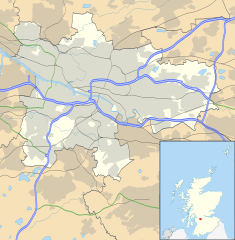Pollokshields Burgh Hall
| Pollokshields Burgh Hall | |
|---|---|
 Pollokshields Burgh Hall | |
| Location | Glasgow |
| Coordinates | 55°50′20″N 4°17′13″W / 55.83891°N 4.28706°WCoordinates: 55°50′20″N 4°17′13″W / 55.83891°N 4.28706°W |
| Built | 1890 |
| Architect | Harry Edward Clifford |
| Architectural style(s) | Scottish Baronial style |
Listed Building – Category A | |
| Designated | 15 December 1970 |
| Reference no. | LB33411 |
 Shown in Glasgow | |
The Pollokshields Burgh Hall is a municipal building at the edge of Maxwell Park, Glasgow, Scotland. The burgh hall, which was briefly the headquarters of Pollokshields Burgh Council, is a Category A listed building.[1]
History[]
The building was commissioned and endowed for future maintenance by the politician, Sir John Stirling Maxwell of Pollok House, as a gift for the people of Pollokshields.[2] The site he selected in Glencairn Drive had formed part of the Old Pollok Estate, which had been home to the Maxwell family for over 700 years.[3]
The burgh hall was designed by Harry Edward Clifford in the Scottish Baronial style[4] and built with dark red sandstone from the Ballochmyle Estate in Ayrshire.[5] A ceremony was held at which Maxwell laid a memorial stone to commemorate the opening of the burgh hall and also the opening of Maxwell Park, which he had also gifted to the local people, on 25 October 1890.[6] The design involved an asymmetrical main frontage facing Glencairn Drive; the main hall, which projected forward was on the left; the right bay featured a gabled porch with a round-headed doorway on the ground floor and a tower above; there was a bartizan on the right hand corner of the tower.[1]
The building was initially used as a masonic meeting place by masonic lodge no. 772[7] and was also briefly used as the headquarters of the independent burgh of Pollokshields until 1891 when the burgh was absorbed into the city of Glasgow in 1891.[2] It was extended in 1935.[1]
After functioning as a day centre for Glasgow Corporation and then, from 1975, for Strathclyde Regional Council, it was deemed surplus to requirements in 1982 and acquired the Pollokshields Burgh Hall Trust for a nominal sum in 1986.[8] Following refurbishment by the trust it reopened for community use in 1997.[8] The lower ground floor was refurbished and converted for conference use with financial support from the National Heritage Memorial Fund in the late 1990s.[9][10] The actress, Keira Knightley, attended her brother's wedding at the hall in April 2011.[11]
Architecture[]
The dominant external feature of the building is the 60-foot (18 m) high tower while the entrance porch exhibits the Maxwell family coat of arms flanked by two Scottish lions.[5]

Foundation Stone

The Tower

Maxwell Coat of Arms

Stained Glass Window donated by Lodge Pollok's 1st Master Morris Carswell

Stained Glass Window donated by Lodge Pollok's 2nd Master David R Clark
See also[]
References[]
- ^ a b c Historic Environment Scotland. "70 and 72 Glencairn Drive, Pollokshields Burgh Hall, including lodge and gateway to Maxwell Park (Category A Listed Building) (LB33411)". Retrieved 14 April 2020.
- ^ a b "Pollokshields". The Glasgow Story. Retrieved 14 April 2020.
- ^ "Pollok House: Old Country Houses of the Old Glasgow Gentry (1878)". Glasgow West-end addresses and their occupants. Retrieved 27 September 2020.
- ^ "Pollokshields Burgh Hall". Dictionary of Scottish Architects. Retrieved 14 April 2020.
- ^ a b "Architecture". Pollokshields Burgh Hall. Retrieved 14 April 2020.
- ^ "About us". Lodge Pollock Park. Retrieved 27 September 2020.
- ^ "No.772 on the roll of the Grand Lodge of Scotland". Lodge Pollock. Retrieved 15 April 2020.
- ^ a b "Pollokshields Burgh Hall". Discover Glasgow. Archived from the original on 4 June 2016. Retrieved 14 April 2020.
- ^ "Pollokshields Burgh Hall". Pollokshields Heritage. Retrieved 19 April 2020.
- ^ "Financial statements for the year ended 31 July 1997". Pollokshields Burgh Hall Trust Limited. Retrieved 19 April 2020.
- ^ "Hollywood star Keira Knightley a bridesmaid at brother's wedding in Glasgow". Daily Record. 25 April 2011. Retrieved 19 April 2020.
External links[]
 Media related to Pollokshields Burgh Hall at Wikimedia Commons
Media related to Pollokshields Burgh Hall at Wikimedia Commons
- City chambers and town halls in Scotland
- Category A listed buildings in Glasgow
- Masonic buildings in Scotland
- Listed government buildings in Scotland
- Government buildings in Glasgow
- 1890 establishments in Scotland
- Pollokshields
- Government buildings completed in 1890
- Masonic buildings completed in 1890





